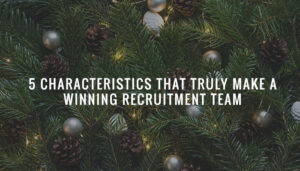Change and evolution is guaranteed in our world. I think we are learning that more and more as typical economic cycles shift from what used to be every 6 to 7 years, to now what is more like every 6 to 7 months!
But within these ever-changing cycles, so too is guaranteed the growth and influence of new technology on a recruitment business.
Let me put this into some perspective.
Humanisation of Recruitment
Personally, I am a huge advocate of the “make recruitment human again” movement (I am not sure this is actually a thing, but it should be!)
I believe our industry has been dumbed down and depersonalised in many cases, as we chose to hide by emails and inmails rather than spend quality time in front of our customers on both the client and candidate side.
This has led to a sea change in how some recruiters are perceived by some hiring organisations – faceless providers of a transactional service – which translates into a very different way that recruiters are therefore treated by those businesses.
I think that has been the cause of many of the issues facing some recruitment businesses, in particular over the last year or so.
The same goes for the candidate side.
The relationship between recruiter and jobseeker has changed. Evolved.
There are very different expectations now about what our interactions should look like. What a “timely manner” looks like. What great service looks like.
In the next couple of years, millennials will make up the majority of our workforces. We know that.
We also know that 41% of millennials say they prefer to communicate electronically at work than face to face or even over the telephone. Surely this tells us something about how we should be engaging with part of our target audience.
AI allows greater alignment between what our candidates expect and what our recruiters are able to deliver around service excellence and when candidates start experiencing that, the relationship transforms.
They want a better level of service and AI supported recruitment processes can give them that.
Optimisation of Recruitment
Irrespective of whether the market conditions are good or bad, recruiters need to be running at higher levels of productivity and performance than they are today.
They need to be optimised.
Take a look at an individual recruiter’s capacity to generate revenue, for example.
This is all based on the amount of time they have available to them to do the core parts of their job that in return have the biggest impact on their net contribution.
Give them more capacity to do more, and so their performance (should) increase, alongside their KPIs and performance thresholds.
This, of course, is where AI can play its most significant part – reducing the friction that slows down different elements of a recruiter’s day job.
And it is this that will get the most buy-in from your recruiters. They will see this not as something to replace them, but something that will enable them to do more, bill more.
They want to do more with less and AI supported recruitment processes can give them that.
Let’s be clear here. There is nothing new about this.
AI has been around for a long time.
But there is a lot new about the functionality and most significantly, accessibility of the new style of AI that is touching just about every part of our lives at the moment, which is why everyone is now playing the game.
So, where to start…
If you are just starting out on your AI journey, you need to start by building out the various workflows across your business. This is good practice anyway for any business, but in AI terms, gives you a better understanding of the numerous different customer engagements and recruiter actions that make up your business.
- Your BD workflow.
- Your marketing workflow.
- Your delivery workflow.
- Your account penetration workflow and so on…
Then look at the various tasks that sit within each workflow, to identify which tasks are repetitive.
- Which tasks are non-core.
- Which tasks need to be done more.
- Which tasks are better off being automated than need to be human centric.
- Or a blend of all four.
That list will be the beginning of your AI wish list, against which there are multiple applications that could, in essence, take those tasks out of the hands of your consultants and into the hands of technology.
Always start with your core systems’ provider.
They are working frantically to build end-to-end AI in to their systems to allow you to automate at will whilst ensuring there is a seamless link between the rest of your tech stack.
Everything is now task focused – less about the systems themselves and more about the outputs of those systems.
From the generation of interview and screening questions, to the translation of candidate outreach messaging into multiple languages and country specific terminology.
From the creation of an employer branding campaign to breaking down job descriptions to match against key words from candidate profiles.
To keyword identification on customer calls to generate training needs, to the creation of customer and candidate personas that link to your content creation strategy.
This year, TRN has relaunched the Createch programme, enabling recruitment businesses to not only navigate their AI / tech journey better, but to also ensure that AI and their tech stack actually drives their business performance forward.
Get in touch if you want to find out more.
Final Point to Note
AI is all about data. It is the core component for any AI application.
We will hear a lot more about how GDPR will come into play here as AI becomes more mainstream in the future, so brace yourself for what may well transform how this whole game is played.
But for now, the quality of the data that goes in (and therefore comes out of it) is at the heart of whether your relationship with AI will flourish or not.
In Summary
Whether we like it or not, those recruitment business leaders who simply chose to ignore the rapid progression of technology will get left behind. This is less about the technology itself and more about a recruitment business’ ability to adapt to new ways of working to remain competitive.
Get it wrong, and it will just be another distraction, another new shiny thing, another excuse to for lazy processes to live and breathe within our businesses.
However, get it right and AI might just be that competitive advantage that many recruiters have been looking for… to be more optimised, more human. Fit for purpose.
Share :



